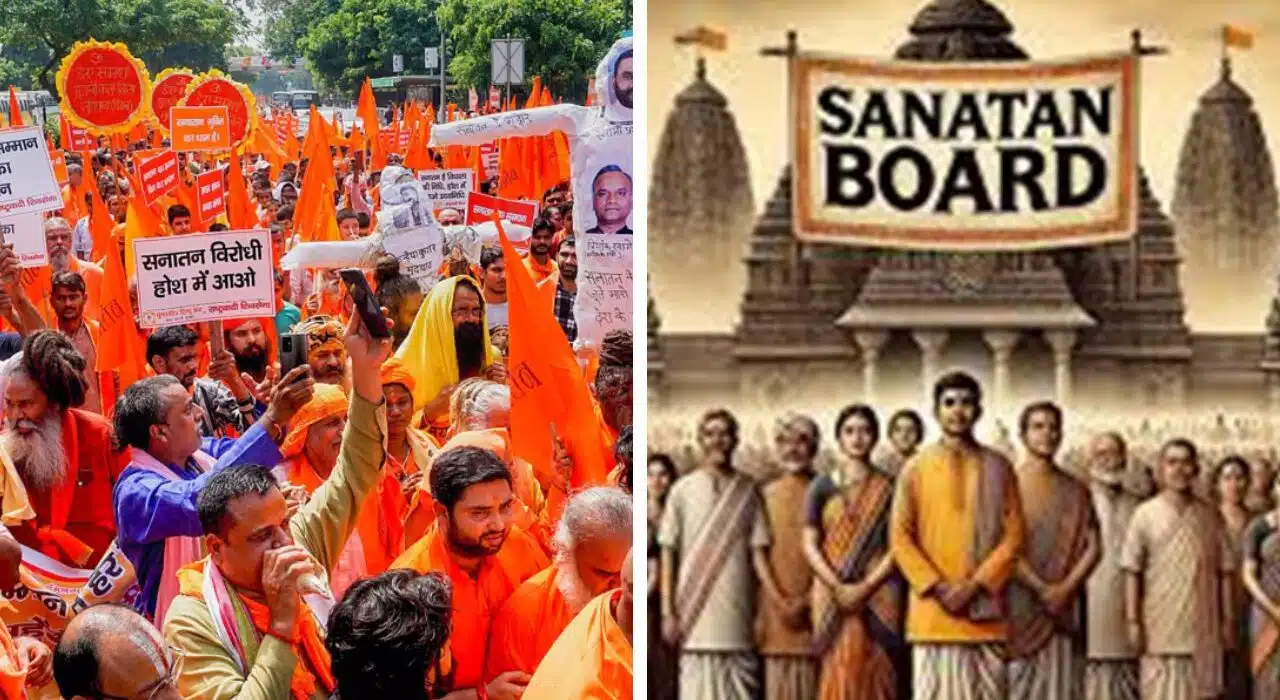The rally demanding a Sanatan Board has churned the political and social waters of India. Held under the banner “Waqf Hatao, Desh Bachao,” at Belagavi, the event attracted several influential leaders within Hindu religious traditions who demanded the creation of a Sanatan Board to deal with the management of Hindu religious properties, much like the Waqf Board that manages assets associated with Islam.
Sri Kadhsiddheshwar Swami of Kaneri Mutt was one of the most vocal individuals calling for the immediate formation of such a board. He pointed out that many Hindu temples and mutts keep no record of their properties, thus vulnerable to encroachment. Arguing that the Sanatan Board could play a crucial role in identifying, fencing, and legally securing those assets, the Swami added.
Who Brought Waqf Bill in the Country?
The seer accused the Waqf Board of violating legal procedures by pointing out that it is politicians who direct officers to hand over the land to the board illegally. He demanded scrapping of the Waqf Board, saying it perpetuates inequality. Waqf laws were brought in by British colonial masters with the intention of dividing the communities and after independence have only heightened religious differences.
Here fuel for the fire was added by none other than Sudhangshu Das, Tripura’s minister for the welfare of Scheduled Castes. In a post on social media, Das took the argument that just as Muslims have the Waqf Board, Hindus need a Sanatan Board; he further appealed for calls to be made by the Christians for their board, the Sikhs for theirs or a complete abolition of all religious boards to bring about proper equality.
Das framed his demand as a constitutional appeal, as he underlined that India’s secular fabric guarantees equal rights to all citizens. His post, hashtagged #HinduUnity, quickly went viral but also drew sharp criticism from the opposition, especially from the CPM. CPM state secretary Jitendra Chaudhary accused the minister of failing to uphold the Constitution, calling for his resignation.
Why A Separate Hindu Board is Needed?
For long, there has been a demand for a Sanatan Board but the demand has gathered steam over the past few months. The argument is that even though the Waqf Board has legal authority over Islamic property, no equivalent structure exists to regulate Hindu properties. This, say the proponents, creates an imbalance, drawing down Hindu institutions.
The Hindu religious leaders and activists claim that the properties belonging to temples and mutts are likely to fall prey to encroachment because of the absence of central oversight. Unlike the Waqf Board, where its claims can be enforced through legal channels, Hindu institutions will have to depend on fragmented local management, which ultimately calls for inconsistent and ineffective protection.
Supporters of the Sanatan Board argue further that the whole system stands on an anti-secular ethos of the Indian State. They feel it discriminates when there is a board for one religious community and there is not for others. The government could, they argue, bring all religions on an equal footing by installing boards for all major religions or completely abolishing them.
Critics Say It Is Only ‘Political Agenda’ to Call for Sanatan Board Rally
However, critics are of the opinion that the demands are politically motivated. They reason that the establishment of multiple religious boards sundered the country further on communal lines. Rather than being a unifying influence, they caution, it could further polarize religious sentiment.
Others argue that there are enough legal mechanisms that would safeguard the assets of religious institutions. Proper enforcement would do the trick rather than multiple bureaucratic bodies.
The Sanatan Board rally has sparked an important debate on religious equality and asset management in India. Demand, after all, finds its roots in perceived imbalance; broader implications must be thought through carefully. It may arise from new boards or reforming existing structures, but the goals must point to upholding constitutional promises of equal rights for all in India.
Also, see: Is Sharad Pawar retiring from politics? Here is what the 83-year-old has to say
